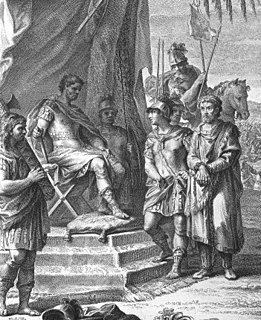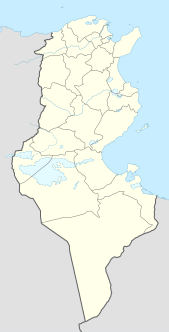Related Research Articles

Jugurtha or Jugurthen was a king of Numidia. When the Numidian king Micipsa, who had adopted Jugurtha, died in 118 BC, Jugurtha and his two adoptive brothers, Hiempsal and Adherbal, succeeded him. Jugurtha arranged to have Hiempsal killed and, after a civil war, defeated and killed Adherbal in 112 BC.

The Jugurthine War was an armed conflict between the Roman Republic and king Jugurtha of Numidia, a kingdom on the north African coast approximating to modern Algeria. Jugurtha was the nephew and adopted son of Micipsa, King of Numidia, whom he succeeded on the throne, overcoming his rivals through assassination, war, and bribery.
Quintus Caecilius Metellus Numidicus was an ancient Roman statesman and general, he was a leader of the Optimates, the conservative faction of the Roman Senate. He was a bitter political opponent of Gaius Marius. He was consul in 109 BC, in that capacity he commanded the Roman forces in Africa during the Jugurthine War. In 107 BC he was displaced from his command by Marius. On his return he was granted a triumph and the cognomen Numidicus. He later became a censor, entering into exile in opposition to Marius. Metellus Numidicus enjoyed a reputation for integrity in an era when Roman politics was increasingly corrupt.
Lucius Postumius Albinus was a statesman of the Roman Republic.

The Battle of the Muthul was fought at the Muthul River in Numidia in 109 BC. The Numidians, led by their king Jugurtha, fought a Roman army commanded by the consul Quintus Caecilius Metellus Numidicus. The battle was fought during the Jugurthine War, a war between King Jugurtha of Numidia and the Roman Republic. The battle was indecisive - it took the Romans four more years to defeat Jugurtha who was captured by Lucius Cornelius Sulla in 105 and executed during Marius' Triumphal parade a year later (104). The Roman historian Publius Rutilius Rufus distinguished himself during the battle, while Gaius Marius' military genius shone through for the first time, saving the day for the Romans.

The Battle of Suthul was an episode of the Jugurthine War. The battle was fought in 110 BC between the Roman force led by the legate Aulus Postumius Albinus and the army of Numidia, led by King Jugurtha. In 110 BC, the consul Spurius Postumius Albinus invaded Numidia, but left soon after to prepare elections in Rome. His brother Aulus Postumus Albinus got the leadership of the Roman army, but was easily tricked by Jugurtha, who trapped the Romans near the town of Suthul, which may be the same location as Calama, near modern-day Guelma in Algeria.
The Siege of Thala, part of the Jugurthine War, was an investment of the Numidian town of Thala by a Roman army. The Romans were commanded by the proconsul Quintus Caecilius Metellus, the Thalans by an unknown Numidian commander. The Romans main objective was to capture the Numidian king Jugurtha who was reported to be in Thala, but he escaped before the legions reached the fortress town. Metellus then besieged the town to get hold of one of Jugurtha's treasuries which was stored in Thala. The fortress town was besieged for forty days after which most of its inhabitants committed suicide by setting fire to the town.
Aulus Postumius Albinus was a Roman senator and military commander. In 110 BC, he went to serve on the staff of his brother, Spurius, in the war against the Numidian king Jugurtha. Left in charge of the troops during the winter, Aulus decided on a rash foray which involved the army in a humiliating defeat and surrender. The disaster led to the establishment of a commission which condemned several prominent aristocrats of collusion with the enemy during the war. Aulus himself was seemingly not condemned, and went on to be elected consul a decade later, in 99 BC. In 89, Aulus held command of a fleet during the Social War in Italy, but proved to be an unpopular commander and was murdered by his troops.
Aulus Postumius Albus Regillensis was a patrician politician of ancient Rome, and apparently son of Aulus Postumius Albus Regillensis, and therefore brother of Spurius Postumius Albus Regillensis. He, or possibly his brother Spurius, was appointed to dedicate the Temple of Castor in 484 BC as duumviri aedi dedicandae.
Spurius Postumius Albus Regillensis, apparently the son of the Spurius Postumius Albus Regillensis who was consul in 466 BC, was a patrician politician of ancient Rome. He was appointed consular tribune in 432 BC, and served as legatus in the war in the following year, under the dictator Aulus Postumius Tubertus. Livy mentions him leading a group of reinforcements at a critical moment.
Spurius Postumius Albinus Regillensis was a Roman politician, of patrician family, of the early 4th century BC. He was elected a military consular tribune in 394 BC, and carried on the war against the Aequians. He at first suffered a bloody defeat, after which rumours reached Rome that he had been killed and his forces destroyed near Tusculum. But the news of his defeat had been overstated, and Postumius and his men afterwards conquered the Aequian force, completely wiping them out.
Spurius Postumius Albinus Caudinus was a politician of Ancient Rome, of patrician rank, of the 4th century BC. He was consul in 334 BC, and invaded, with his colleague Titus Veturius Calvinus, the country of the Sidicini. But on account of the great forces which the enemy had collected, and the report that the Samnites were coming to their assistance, a dictator was appointed, Publius Cornelius Rufinus.
Aulus Postumius Albinus Luscus was a politician of Ancient Rome, of patrician rank, of the 2nd century BC. He was curule aedile in 187 BC, when he exhibited the Great Games, praetor in 185 BC, and consul in 180 BC. In his consulship he conducted the war against the Ligurians.
Spurius Postumius Albinus Paullulus was a politician of ancient Rome, of patrician rank, of the 2nd century BC. He was praetor in Sicily in 183 BC, and consul in 174 BC. He was probably a brother of Aulus Postumius Albinus Luscus and Lucius Postumius Albinus, and perhaps obtained the agnomen of "Paullulus" by being small of stature, to distinguish him more accurately from his two brothers.
Lucius Postumius Albinus was a politician of ancient Rome, of patrician rank, of the 2nd century BC. He was curule aedile in 161 BC, and exhibited the Ludi Megalenses, at which Terence's play Eunuchus had debuted. He was consul in 154 BC, and died seven days after he had set out from Rome in order to go to his province. It was supposed that he was poisoned by his wife, Publilia.
Spurius Postumius Albinus Magnus was a politician of ancient Rome, of patrician rank, during the 2nd century BC. He was consul in 148 BC, in which year a great fire happened at Rome. It is this Spurius Albinus of whom Cicero speaks in the Brutus, and says that there were many orations of his.

The gens Postumia was a noble patrician family at ancient Rome. Throughout the history of the Republic, the Postumii frequently occupied the chief magistracies of the Roman state, beginning with Publius Postumius Tubertus, consul in 505 BC, the fifth year of the Republic. Although like much of the old Roman aristocracy, the Postumii faded for a time into obscurity under the Empire, individuals bearing the name of Postumius again filled a number of important offices from the second century AD to the end of the Western Empire.
Spurius Carvilius Maximus Ruga was Roman consul in 234 and 228 BC. Spurius Carvilius Ruga, the schoolteacher, was his freedman.
The Siege of the fortress at Muluccha, part of the Jugurthine War, was an investment of a Jugurthine fortress by a Roman army in 106 BC. The Romans were commanded by Gaius Marius, the Numidians by an unknown commander. The Romans main objective was to capture one of king Jugurtha's treasuries which was reported to be inside the fortress. Marius besieged the fortress town and finally took it by trickery.

The Siege of Zama, part of the Jugurthine War, was an investment of the Numidian town of Zama by a Roman army. The Romans were commanded by Quintus Caecilius Metellus, one of the consuls of 109 BC, while the Numidians were under the overall command of Jugurtha, the king of Numidia. The Romans' main objective was to lure Jugurtha into a set-piece battle; the Numidians had been wearing down the Roman legions by guerilla warfare and the Roman commander hoped the siege would pressure the Numidian king into giving battle. Jugurtha did not let himself be goaded into a pitched battle and kept up his opportune attacks while the defenders of Zama kept the Romans at bay. Failing to take the city and failing to provoke the Numidian king into entering a set-piece battle, the Romans gave up on the siege and marched back to the Roman province of Africa.
References
- ↑ Smith, William (1867), "Spurius Postumius Albinus (20)", in Smith, William (ed.), Dictionary of Greek and Roman Biography and Mythology , 1, Boston: Little, Brown and Company, p. 92
- ↑ Sallust, Jugurthine War Jug. 35, 36, 39, 44
- ↑ Orosius, iv. 15
- ↑ Eutropius, iv. 26
- ↑ Cicero, Brut. 34
- ↑ comp. Sallust, Jugurthine War 40
![]() This article incorporates text from a publication now in the public domain : Smith, William, ed. (1870). "Albinus (20)". Dictionary of Greek and Roman Biography and Mythology . 1. p. 92.
This article incorporates text from a publication now in the public domain : Smith, William, ed. (1870). "Albinus (20)". Dictionary of Greek and Roman Biography and Mythology . 1. p. 92.